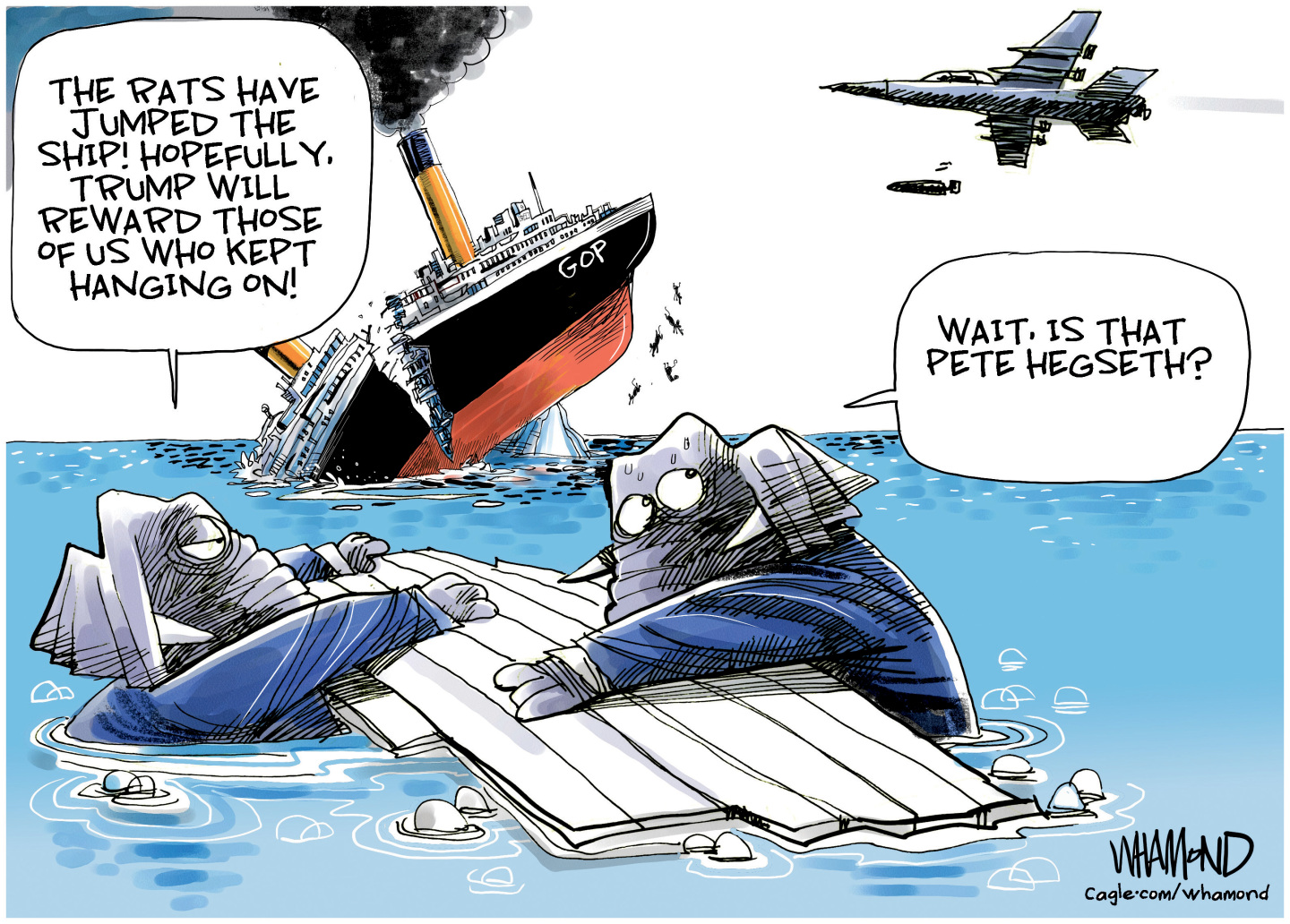Donald Trump is dead wrong. America is a fabulously rich and great nation.
The U.S. isn't bankrupt. Our pockets aren't empty. We aren't a pauper nation.


America isn't broke. Nor is it on the verge of a government debt crisis (whatever "crisis" even means for a nation whose debt is printed in a currency that is both its own and the world's reserve). America is not in decay, and the last thing the U.S. should do is rashly withdraw from a dangerous world because of those mistaken beliefs.
This should be especially clear after the Belgium terror attacks.
Yet retreat is just what Donald Trump seems to be proposing. In an interview with The Washington Post editorial board Monday, Trump questioned the U.S. role in NATO and presence in Asia due to the financial burden they require:
The Week
Escape your echo chamber. Get the facts behind the news, plus analysis from multiple perspectives.

Sign up for The Week's Free Newsletters
From our morning news briefing to a weekly Good News Newsletter, get the best of The Week delivered directly to your inbox.
From our morning news briefing to a weekly Good News Newsletter, get the best of The Week delivered directly to your inbox.
I mean, we pay billions — hundreds of billions of dollars to supporting other countries that are in theory wealthier than we are. … When you look at the kind of money that our country is losing, we can't afford to do this. Certainly we can't afford to do it anymore…. I think we were a very powerful, very wealthy country. And we're a poor country now. [Trump]
Looks like we finally found something Trump is in favor of off-shoring: America's security.
Now, it's certainly legitimate to evaluate the mission and cost of America's overseas military commitments and posture. But that's different thing than scrapping our military alliances — or threatening to do so as some ham-handed budget negotiating tactic. Leading the free world, reassuring allies, and deterring aggression have little overlap with the skills needed to drive a hard bargain with a potential tenant in Trump Tower.
And yet, Republicans might give Trump's defense policy ideas more of a hearing than they deserve because of their persistent debt fears. After all, it's mainstream GOP economic thought that U.S. finances are precarious. How could they not be given the $19 trillion federal debt — $22 trillion if you include state and local government? These are figures Trump always mentions, as do many Republican politicians. They provide handy justification for arguing we can't afford to invest in science, repair and upgrade our infrastructure, or bolster wages for low-income workers.
But here's the thing: The U.S. is far from a poor nation. American households entered 2016 with a net worth of nearly $87 trillion, according to the Federal Reserve. To put that ginormous number in some context, China's private wealth has been estimated at $23 trillion. Even if you factor in America's debt-laden public sector and China's large state-owned companies, the U.S. still has a $45 trillion wealth edge.
A free daily email with the biggest news stories of the day – and the best features from TheWeek.com
There are other ways of looking at national wealth that also show America's riches. The value of U.S. intellectual capital has been estimated at around $9 trillion, with the value of the intangible assets — such as patents, copyrights, and general business methods — at nearly $15 trillion. And given Trump's appreciation of brands — he generously values his own at $3 billion — you would think the businessman would appreciate America's, which has been valued at close to $20 trillion.
Maybe all this wealth is one reason global financial markets don't seem so worried about the U.S. debt. Well, that and the U.S. tax burden being one of the lowest in the developed world. The dollar is strong, and interest rates are low, as are inflation expectations. None of this is to say the U.S. should be a spendthrift in either defense or social spending. Without entitlement reform, Medicare and Social Security will require massive tax increases to keep their promises. Yet Trump would leave them untouched, vowing implausibly to fix their fiscal problems through higher economic growth alone.
The U.S. isn't bankrupt. Our pockets aren't empty. We aren't a pauper nation.
But, of course, you can't promise to make America great again without arguing that it currently isn't.
James Pethokoukis is the DeWitt Wallace Fellow at the American Enterprise Institute where he runs the AEIdeas blog. He has also written for The New York Times, National Review, Commentary, The Weekly Standard, and other places.
-
 Political cartoons for December 20
Political cartoons for December 20Cartoons Saturday’s political cartoons include drowning rats, the ACA, and more
-
 5 fairly vain cartoons about Vanity Fair’s interviews with Susie Wiles
5 fairly vain cartoons about Vanity Fair’s interviews with Susie WilesCartoon Artists take on demolition derby, alcoholic personality, and more
-
 Joanna Trollope: novelist who had a No. 1 bestseller with The Rector’s Wife
Joanna Trollope: novelist who had a No. 1 bestseller with The Rector’s WifeIn the Spotlight Trollope found fame with intelligent novels about the dramas and dilemmas of modern women
-
 Has Zohran Mamdani shown the Democrats how to win again?
Has Zohran Mamdani shown the Democrats how to win again?Today’s Big Question New York City mayoral election touted as victory for left-wing populists but moderate centrist wins elsewhere present more complex path for Democratic Party
-
 Millions turn out for anti-Trump ‘No Kings’ rallies
Millions turn out for anti-Trump ‘No Kings’ ralliesSpeed Read An estimated 7 million people participated, 2 million more than at the first ‘No Kings’ protest in June
-
 Ghislaine Maxwell: angling for a Trump pardon
Ghislaine Maxwell: angling for a Trump pardonTalking Point Convicted sex trafficker's testimony could shed new light on president's links to Jeffrey Epstein
-
 The last words and final moments of 40 presidents
The last words and final moments of 40 presidentsThe Explainer Some are eloquent quotes worthy of the holders of the highest office in the nation, and others... aren't
-
 The JFK files: the truth at last?
The JFK files: the truth at last?In The Spotlight More than 64,000 previously classified documents relating the 1963 assassination of John F. Kennedy have been released by the Trump administration
-
 'Seriously, not literally': how should the world take Donald Trump?
'Seriously, not literally': how should the world take Donald Trump?Today's big question White House rhetoric and reality look likely to become increasingly blurred
-
 Will Trump's 'madman' strategy pay off?
Will Trump's 'madman' strategy pay off?Today's Big Question Incoming US president likes to seem unpredictable but, this time round, world leaders could be wise to his playbook
-
 Democrats vs. Republicans: who are US billionaires backing?
Democrats vs. Republicans: who are US billionaires backing?The Explainer Younger tech titans join 'boys' club throwing money and support' behind President Trump, while older plutocrats quietly rebuke new administration
